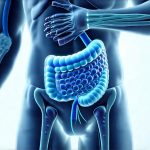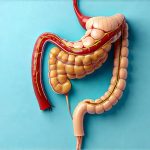Irritable Bowel Syndrome (IBS) is a common gastrointestinal disorder affecting millions worldwide. While often chronic, understanding its nuances – including specific subtypes like IBS with diarrhea (IBS-D), coded as K58.0 in the International Classification of Diseases – can significantly improve management and quality of life. This article will delve into the triggers, symptoms, causes, diagnosis, treatment options, and strategies for living well with IBS-D.
What is IBS with Diarrhea?
IBS-D, or Irritable Bowel Syndrome predominantly characterized by diarrhea, is a functional gastrointestinal disorder. “Functional” means there’s no visible damage to the digestive tract when tests are conducted; the issue lies in how the gut functions. Unlike Inflammatory Bowel Disease (IBD) such as Crohn’s disease or ulcerative colitis which involve inflammation and structural changes, IBS-D centers around disruptions in gut motility – the speed at which food moves through your system – visceral hypersensitivity (increased pain perception), and brain-gut interactions. This leads to frequent episodes of diarrhea alongside abdominal discomfort. The “K58.0” designation is a specific medical code used for diagnostic and billing purposes, helping healthcare professionals accurately identify this subtype. It’s important to remember that IBS-D isn’t a disease in itself but a syndrome – a collection of symptoms – requiring individualized management.
Common Symptoms and Associated Conditions
The hallmark symptom of IBS-D is frequent loose stools, often occurring multiple times a day. This diarrhea can be urgent and difficult to control, impacting daily activities. However, it’s rarely accompanied by blood or mucus, distinguishing it from inflammatory conditions like IBD. Abdominal pain is also central, typically described as cramping, bloating, or discomfort that may lessen after a bowel movement. Other common symptoms include excessive gas, feeling of incomplete evacuation (needing to go even when you think you’re empty), and visible abdominal bloating. The severity of these symptoms can fluctuate significantly – periods of heightened distress are often interspersed with calmer phases.
Many people with IBS-D also experience associated conditions. Anxiety and depression are frequently observed alongside IBS, suggesting a strong mind-gut connection. Food intolerances, especially to FODMAPs (Fermentable Oligosaccharides, Disaccharides, Monosaccharides And Polyols), are common triggers that exacerbate symptoms. Fatigue is another frequent complaint, potentially linked to malabsorption or disrupted sleep due to digestive discomfort. Additionally, some individuals with IBS-D may experience other functional gastrointestinal disorders like Functional Dyspepsia (indigestion).
Causes and Risk Factors
The exact cause of IBS-D remains unknown, but a combination of factors is believed to contribute to its development. It’s not caused by one single thing, making diagnosis and treatment more complex. Disruptions in the gut microbiome – the trillions of bacteria residing in our digestive tract – are increasingly recognized as playing a significant role. An imbalance (dysbiosis) can affect digestion, immune function, and nerve signaling within the gut.
Visceral hypersensitivity is another key factor; individuals with IBS-D often have increased sensitivity to normal amounts of gas or stool in the colon, leading to pain even at levels that wouldn’t bother others. Problems with brain-gut interactions – the communication pathway between the brain and digestive system – are also thought to play a role. Stress, anxiety, and past trauma can all impact this communication, potentially contributing to symptom flare-ups.
Certain risk factors may increase susceptibility to IBS-D. A family history of IBS or other functional gastrointestinal disorders suggests a genetic component. Previous gastrointestinal infections (gastroenteritis – “stomach flu”) can sometimes trigger the onset of IBS symptoms, known as post-infectious IBS. Diet also plays a role; high FODMAP intake and certain food sensitivities can exacerbate symptoms. Finally, psychological factors like stress, anxiety, and depression are often linked to increased risk and symptom severity.
Diagnosis, Treatment, and Living with the Condition
This section will cover how a healthcare professional arrives at an IBS-D diagnosis, available treatment options to manage symptoms, and strategies for living a fulfilling life while managing this chronic condition. It’s about empowering you with knowledge to take control of your health and wellbeing.
Diagnosis and When to See a Doctor
Diagnosing IBS-D is often based on symptom criteria rather than specific tests, as there’s no definitive test to confirm it. The Rome IV diagnostic criteria are commonly used: recurrent abdominal pain at least one day per week in the last three months, related to defecation or change in stool frequency, and accompanied by two or more of the following features: differentiation of stool consistency from normal, urgency, feeling of incomplete evacuation, or passage of mucus.
Your doctor will likely ask about your medical history, diet, lifestyle, and conduct a physical exam. They may also order tests to rule out other conditions with similar symptoms, such as IBD, celiac disease, lactose intolerance, and infections. These tests might include blood tests (to check for inflammation or anemia), stool tests (to look for infection or malabsorption), and potentially colonoscopy or sigmoidoscopy (to visually inspect the colon). It’s important to see a doctor if you experience persistent changes in bowel habits, abdominal pain, bloating, or rectal bleeding. These symptoms could indicate a more serious underlying condition that requires prompt attention.
Treatment Options
Treatment for IBS-D focuses on symptom management and improving quality of life. There’s no “cure,” but effective strategies can significantly reduce discomfort and improve daily functioning. Dietary modifications are often the first line of defense. The low-FODMAP diet, guided by a registered dietitian, is frequently recommended to identify trigger foods and reduce gas and bloating. Small, frequent meals can also help manage symptoms.
Medications may be used to address specific symptoms. Antidiarrheals like loperamide (Imodium) can help control diarrhea. Antispasmodics may relieve abdominal cramping. In some cases, antidepressants (SSRIs or TCAs), even in low doses, can help reduce pain and improve gut motility – they work on the brain-gut axis. Newer treatments include bile acid sequestrants like eluxadoline, which can slow down bowel movements and reduce diarrhea, but come with potential side effects and require careful monitoring by a physician. Probiotics, while showing some promise, have varying results, and specific strains may be more effective for different individuals.
Living with [Diagnosis]
Living with IBS-D requires ongoing self-management and lifestyle adjustments. Stress management techniques like mindfulness, yoga, or meditation can help reduce symptom flare-ups. Regular exercise is also beneficial for gut health and overall wellbeing. Identifying and avoiding personal triggers – specific foods, stressors, or activities – is crucial. Maintaining a food diary can help pinpoint problematic items.
Building a strong relationship with your healthcare team—doctor, dietitian, and potentially a therapist—is essential. Open communication allows for personalized treatment plans and adjustments as needed. Support groups and online communities can provide valuable emotional support and practical advice from others living with IBS-D. Don’t hesitate to advocate for yourself and seek the care you need. Remember that managing IBS-D is a journey, and finding what works best for you takes time and patience.
Summary
IBS-D (K58.0) is a functional gastrointestinal disorder characterized by frequent diarrhea and abdominal discomfort. While the exact cause remains complex, factors like gut microbiome imbalances, visceral hypersensitivity, and brain-gut interactions play significant roles. Diagnosis relies on symptom criteria, and treatment focuses on managing symptoms through dietary changes, medications, stress management, and lifestyle adjustments. Living well with IBS-D requires proactive self-management and a collaborative relationship with your healthcare team.
Have you been diagnosed with IBS-D? Share your experience or ask your questions in the comments — we’re here to help.


















